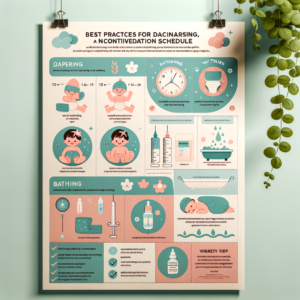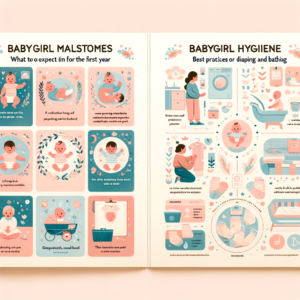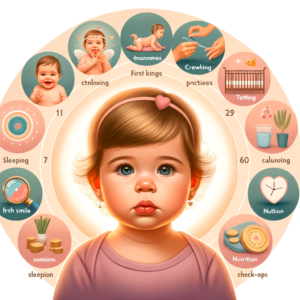As a parent, it’s natural to worry about your babygirl’s health. While many health issues are minor and resolve on their own, it’s important to be aware of common concerns and know when to seek medical attention. This comprehensive guide will cover the most frequent health issues that babygirls may face, along with tips for prevention and care.
Fever
Fever is a common sign that your babygirl’s body is fighting an infection.
What to Look For:
- Rectal temperature of 100.4°F (38°C) or higher
- Fussiness, lethargy, or changes in eating habits
When to Call the Doctor:
- For babies under 3 months: Any fever
- For babies 3-6 months: Fever of 101°F (38.3°C) or higher
- For babies over 6 months: Fever lasting more than 24 hours
Home Care:
- Keep your babygirl hydrated
- Dress her in light clothing
- Use a lukewarm compress to help cool her down
Colds and Flu
Respiratory infections are common in babies as their immune systems develop.
Symptoms:
- Runny or stuffy nose
- Cough
- Mild fever
- Decreased appetite
Prevention:
- Frequent handwashing for family members
- Keep your babygirl away from sick individuals
- Consider flu vaccination (for babies 6 months and older)
Home Care:
- Use saline drops and a nasal aspirator to clear congestion
- Run a cool-mist humidifier
- Ensure plenty of rest and fluids
Diaper Rash
Diaper rash is a common skin irritation in the diaper area.
Prevention:
- Change diapers frequently
- Clean the area thoroughly during changes
- Allow some diaper-free time
Treatment:
- Apply a barrier cream with zinc oxide
- Use gentle, fragrance-free wipes or just water for cleaning
- If persistent, consult your pediatrician about antifungal creams
Ear Infections
Ear infections are common in babies and can be quite painful.
Symptoms:
- Tugging at ears
- Fussiness or crying
- Difficulty sleeping
- Fever
Prevention:
- Breastfeed if possible (helps boost immunity)
- Keep your babygirl upright during feedings
- Avoid secondhand smoke exposure
When to See a Doctor:
- If you suspect an ear infection, especially if accompanied by fever
Gastroenteritis (Stomach Flu)
Gastroenteritis can cause vomiting and diarrhea, leading to dehydration.
Symptoms:
- Vomiting
- Diarrhea
- Fever
- Decreased appetite
Prevention:
- Practice good hand hygiene
- Properly clean and store feeding equipment
Home Care:
- Focus on hydration (breast milk, formula, or oral rehydration solutions)
- Gradually reintroduce normal diet as symptoms improve
When to Call the Doctor:
- Signs of dehydration (dry mouth, no tears when crying, fewer wet diapers)
- Bloody stools
- High fever
Teething
Teething can cause discomfort and fussiness in babies.
Symptoms:
- Excessive drooling
- Chewing on objects
- Irritability
- Slight increase in temperature (but not a true fever)
Relief Methods:
- Offer a cool teething ring
- Gently massage gums with a clean finger
- Use over-the-counter pain relievers if recommended by your pediatrician
Skin Conditions
Babies are prone to various skin conditions due to their sensitive skin.
Common Issues:
- Eczema: Dry, itchy, red patches of skin
- Cradle Cap: Scaly patches on the scalp
- Baby Acne: Small red or white bumps on the face
General Care:
- Use gentle, fragrance-free products
- Keep skin moisturized
- Avoid harsh soaps and long baths
When to Consult a Doctor:
- If skin conditions persist or worsen despite home care
- If there are signs of infection (increased redness, warmth, or pus)
Allergies
Allergies can develop in babies, though they’re less common in the first year.
Common Allergens:
- Cow’s milk
- Eggs
- Peanuts
- Tree nuts
- Soy
- Wheat
Symptoms:
- Hives or rash
- Swelling of face or extremities
- Vomiting or diarrhea
- Difficulty breathing (severe cases)
Prevention and Management:
- Introduce new foods one at a time
- If there’s a family history of allergies, consult your pediatrician about introduction of common allergens
Frequently Asked Questions
Q: How can I tell if my babygirl is seriously ill? A: Trust your instincts. If your baby seems unusually lethargic, has a high fever, is having trouble breathing, or you’re concerned for any reason, don’t hesitate to contact your pediatrician.
Q: Should I worry if my babygirl isn’t reaching developmental milestones? A: Every baby develops at their own pace. However, if you’re concerned about your baby’s development, discuss it with your pediatrician.
Q: How often should my babygirl have check-ups? A: In the first year, check-ups are typically scheduled at 1, 2, 4, 6, 9, and 12 months. Your pediatrician may recommend a different schedule based on your baby’s needs.
Q: When should I start brushing my babygirl’s teeth? A: Start cleaning your baby’s gums before teeth emerge. Once teeth appear, use a soft infant toothbrush with a tiny smear of fluoride toothpaste.
Q: How can I prevent SIDS (Sudden Infant Death Syndrome)? A: Always place your baby on her back to sleep, use a firm sleep surface, keep the crib free of soft objects and loose bedding, and avoid overheating.
Conclusion
While this guide covers many common health concerns, it’s important to remember that every babygirl is unique. Always trust your parental instincts and don’t hesitate to contact your pediatrician with any concerns about your baby’s health.
Preventive care, including regular check-ups, vaccinations, and good hygiene practices, can help keep your babygirl healthy. However, some illnesses are a normal part of childhood and help build a strong immune system.
Remember, you’re doing a great job caring for your little one. Stay informed, stay vigilant, and enjoy watching your babygirl grow and thrive!


